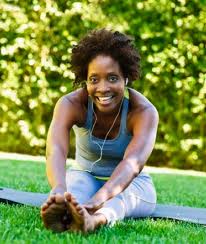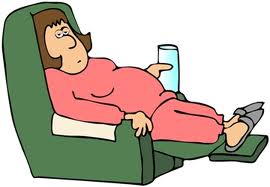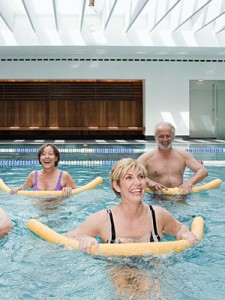 Exercise is a common prescription for insomnia. But spending 45 minutes on the treadmill one day won’t translate into better sleep that night, according to new Northwestern Medicine® research.
Exercise is a common prescription for insomnia. But spending 45 minutes on the treadmill one day won’t translate into better sleep that night, according to new Northwestern Medicine® research.
“If you have insomnia you won’t exercise yourself into sleep right away,” said lead study author Kelly Glazer Baron, PhD, a clinical psychologist and director of the behavioral sleep program at Northwestern University Feinberg School of Medicine. “It’s a long-term relationship. You have to keep at it and not get discouraged.”
This is the first long-term study to show aerobic exercise during the day does not result in improved sleep that same night when people have existing sleep problems. Most studies on the daily effects of exercise and sleep have been done with healthy sleepers. The study also showed people exercise less following nights with worse sleep.
The study was published August 15 in the Journal of Clinical Sleep Medicine. Baron conducted the study with coauthor Kathryn Reid, PhD, research associate professor of neurology at Feinberg and senior author Phyllis Zee, MD, PhD, the Benjamin and Virginia T. Boshes Professor of Neurology at Feinberg and director of the Sleep Disorders Center at Northwestern Memorial Hospital.
"This new study shows exercise and sleep affect each other in both directions: regular long-term exercise is good for sleep, but poor sleep can also lead to less exercise. So in the end, sleep still trumps everything as far as health is concerned," Zee said.
Baron decided to analyze the daily effect of exercise after hearing her patients with insomnia complain the exercise she recommended didn’t help them right away. “The prevailing thought is that exercise improves sleep, but I thought it probably wasn’t that simple for people with insomnia,” reported Baron.
Why does it take time for exercise to impact sleep?
“Patients with insomnia have a heightened level of brain activity and it takes time to re-establish a more normal level that can facilitate sleep,” Zee said. “Rather than medications, which can induce sleep quickly, exercise may be a healthier way to improve sleep because it could address the underlying problem.”
The study participants were older women, who have the highest prevalence of insomnia. Exercise is an optimum approach to promote sleep in an older population because drugs can cause memory impairment and falls. Baron thinks the results also could apply to men because there is no evidence of gender differences in behavioral treatments for insomnia.
The key message is that people with sleep disturbances have to be persistent with exercise.
“People have to realize that even if they don’t want to exercise, that’s the time they need to dig in their heels and get themselves out there,” Baron said. “Write a note on your mirror that says ‘Just Do It!’ It will help in the long run.”

 Many African-American women in a small survey said they avoided exercise at least sometimes because it could ruin their hairstyles, researchers reported.
Many African-American women in a small survey said they avoided exercise at least sometimes because it could ruin their hairstyles, researchers reported. Women who exercise regularly spend as much time sitting as women who don’t, according to a new Northwestern Medicine study. Emerging research shows that prolonged sitting has significant health consequences that even being a dedicated exerciser doesn't prevent women from spending too much of their day sitting.
Women who exercise regularly spend as much time sitting as women who don’t, according to a new Northwestern Medicine study. Emerging research shows that prolonged sitting has significant health consequences that even being a dedicated exerciser doesn't prevent women from spending too much of their day sitting. According to a recent study, exercising or practicing meditation may be effective in reducing acute respiratory infections. Acute respiratory infections, which are caused by influenza and other viruses, are very common illnesses and account for millions of doctor visits and lost school and work days each year. Previous research has suggested that enhancing general physical and mental health may offer protection against these illnesses. Findings from this
According to a recent study, exercising or practicing meditation may be effective in reducing acute respiratory infections. Acute respiratory infections, which are caused by influenza and other viruses, are very common illnesses and account for millions of doctor visits and lost school and work days each year. Previous research has suggested that enhancing general physical and mental health may offer protection against these illnesses. Findings from this Results of a recent study in
Results of a recent study in  Simply ejecting your rear from the couch means your hand will spend less time digging into a bag of chocolate chip cookies.
Simply ejecting your rear from the couch means your hand will spend less time digging into a bag of chocolate chip cookies. A new simulation model predicts weight changes with varying diets and exercise plans. Researchers at the National Institutes of Health (NIH) have created a mathematical model — and an accompanying online weight simulation tool — of what happens when people of varying weights, diets and exercise habits try to change their weight. The findings challenge the commonly held belief that eating 3,500 fewer calories — or burning them off exercising — will always result in a pound of weight loss.
A new simulation model predicts weight changes with varying diets and exercise plans. Researchers at the National Institutes of Health (NIH) have created a mathematical model — and an accompanying online weight simulation tool — of what happens when people of varying weights, diets and exercise habits try to change their weight. The findings challenge the commonly held belief that eating 3,500 fewer calories — or burning them off exercising — will always result in a pound of weight loss. Being physically active is one of best ways people with arthritis can improve their health, but a new study from Northwestern University Feinberg School of Medicine shows that more than half of women and 40 percent of men with arthritis are virtually couch potatoes.
Being physically active is one of best ways people with arthritis can improve their health, but a new study from Northwestern University Feinberg School of Medicine shows that more than half of women and 40 percent of men with arthritis are virtually couch potatoes. A healthy heart is like a rubber band. The more elastic it is, the better it works. A new study by Benjamin Levine at the Texas Health Presbyterian hospital in Dallas shows lifelong exercise can help your heart stay that way.
A healthy heart is like a rubber band. The more elastic it is, the better it works. A new study by Benjamin Levine at the Texas Health Presbyterian hospital in Dallas shows lifelong exercise can help your heart stay that way.